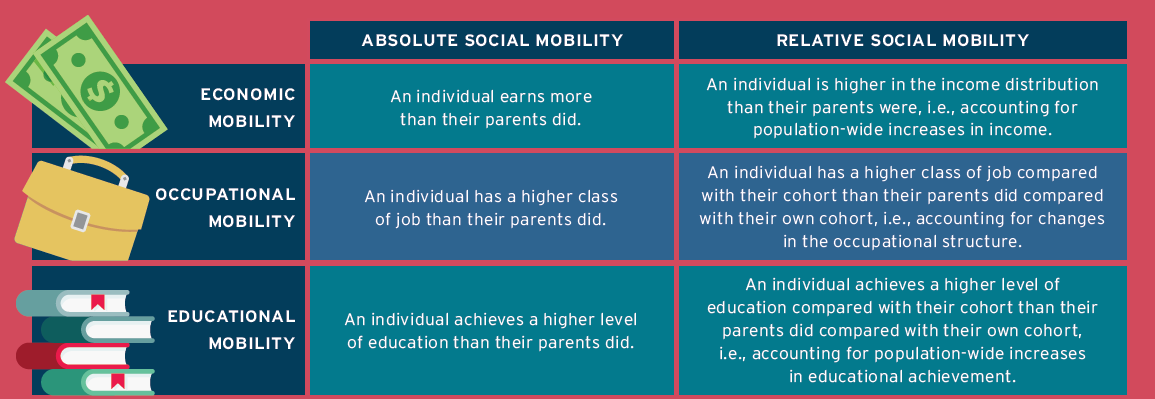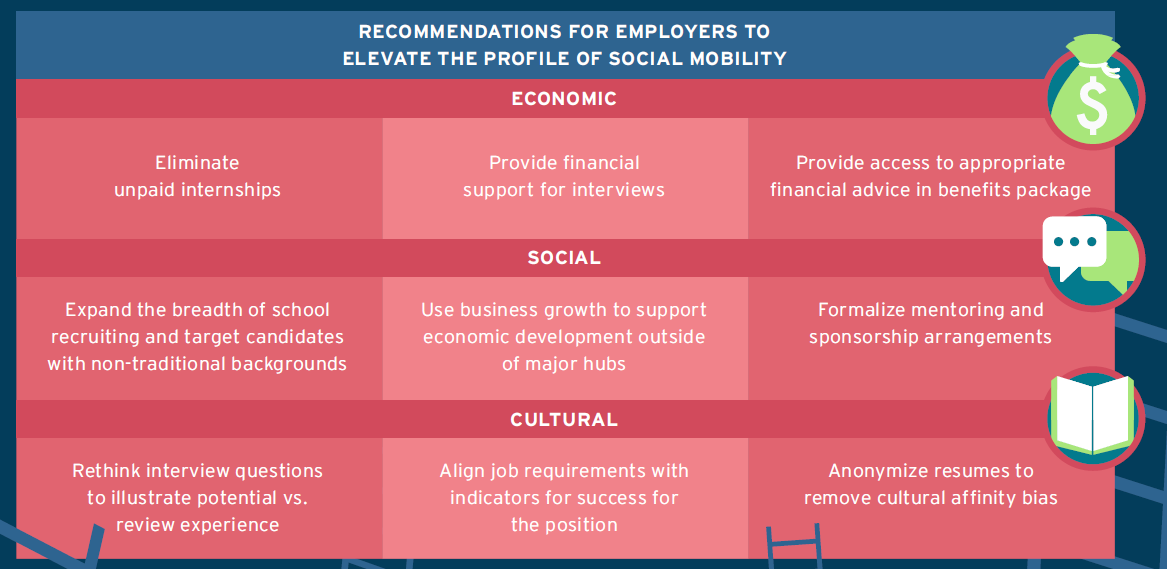Economic and Social Mobility

Although socioeconomic diversity lags race and gender on corporate diversity agenda, employers are playing a significant role in improving economic and social mobility. Yet, there is still more to do and, with a more supportive ecosystem, employers could go further faster.
Social mobility is the idea of the American Dream: that opportunity should be afforded to each of us in accordance not with our background but with our ability. In other words, our chances to succeed should be determined not by the circumstances of our birth but by our own efforts. While many aim for this, in most countries, mobility remains a challenge, and where you come from does significantly impact your lifetime outcomes.
Improving social and economic mobility is not just the right thing to do socially, it also makes economic sense: According to the World Economic Forum, a 10-point increase in each country’s Global Social Mobility Index score could lead to a $514 billion increase in global GDP. In the U.S. and Europe mobility rates are low and there is a risk they could fall even lower given the effects of the pandemic on education together with the rising share of lifetime income made up of intergenerational wealth transfers.

No single lever is enough to solve the social mobility challenge. Education, which is often tasked with improving social mobility, is crucial but is certainly not able to take on the task alone We believe that there is now sufficient evidence of the economic importance for the topic of social mobility to move up the global political agenda. Yet, cultivating the conditions for mobility is not a task only for policymakers: Employers can play a significant role in ensuring fair access to the labor market.
We find that employers are largely focused on early career access to the labor market for young people, reflecting a wider ecosystem interest in intergenerational mobility. Employers are delivering a wide range of interventions, which broadly fall into three categories:
- Philanthropic programs that are largely unconnected to the recruitment process.
- Organized schemes for applicants from lower socioeconomic backgrounds.
- System change, including culture change, to facilitate interaction with an organization regardless of socioeconomic background.
Employers face multiple challenges to improving social mobility, but two appear particularly common: data challenges and attitudinal difficulties in convincing management and staff that social mobility is a worthy issue. However, even if employers are not convinced of the benefits of trying to recruit and retain a more socioeconomically diverse workforce, an approach to diversity that is grounded in social mobility can better support existing race and gender goals.
Intergenerational Social Mobility
Intergenerational social mobility — the extent to which an individual's socioeconomic status persists over time — can be a factor of economic mobility (income and wealth), position in the occupational structure, or level of education. It can also be absolute or relative.

Economic Potential of Improving Intergenerational Social Mobility
Social mobility is a challenge across many countries. From an econmic view, the World Economic Forum found $514 billion could be added to the global economy if the countries in their study increased rankings in the Global Social Mobility Index by 10 points. In addition to the moral and business case, arguments for focusing on social mobility at both the national and global levels include that (1) poor prospects for social mobility weigh on economic growth, and (2) social immobility risks political unrest and undermines social cohesion.

Complex Motivations for Employers to Act on Social Mobility
In interviews with UK corproate HR leaders and in-business champions for social mobility, a "moral" motivation to improve social mobility dominated. However, when asked, all employers saw a business benefit to increasing social mobliity. The reasons employers cited for acting on social mobliity fell into two groups: direct economic factors and ecosystem development.

Catalyzing Social Mobility Through Employers
Although education is often tasked with improving social mobility, employers play a significant role in solving the social mobility challenge. Employers are delivering a wide range of interventions — philanthropic programs, organized schemes for applicants from lower socioeconomic backgrounds, and system change to facilitate interaction with an organization regardless of socioeconomic background. Employers can further mitigate the impact of a lack of economic, social, and cultural capital.



